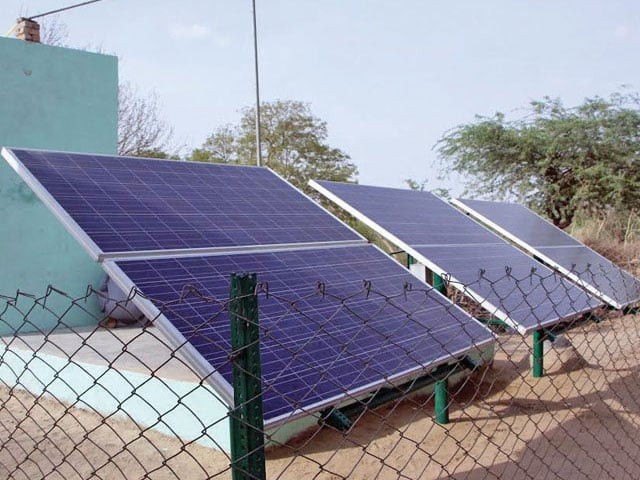K-P govt to switch provincial healthcare centres to solar
Officials say uninterrupted power would help provide facilities around the clock

Officials say uninterrupted power would help provide facilities around the clock. PHOTO: EXPRESS
Apart from providing power to healthcare facilities around the clock, the move hopes to save on grid electricity, apart from slicing the power bill of public institutions and boost its green footprint.
The solar plan, shared by the government on social media, proposes spending Rs344 million in 2017-18 across the province, including Rs241.43 million on setting up solar panels for major hospitals and other health facilities in the urban areas and Rs102.56million for district hospitals.
Solar panels installed in 405 schools across K-P
The plan, however, would not provide power to any offices of the health department.
The entire plan is expected to ‘pay back’ its cost – by saving on power bills and lost productivity - within a period of 30 months.
The plan was undertaken after the health department undertook a survey following complaints of massive disruption in providing healthcare owing to power failures.
The survey of basic health units, with the aim of providing services around the clock at the district level including at Rural Health Centres (RHC), was conducted by an Independent Monitoring Unit (IMU).
It reviewed power supply problems and determined the cost of energising these facilities using solar power. The IMU found that 60 of the 1,258 facilities in K-P were operating without any power, while 121 were witnessing 10-hours of load shedding.
Further, the IMU report showed that 14 per cent of the 221 RHCs falling in category-A of K-P healthcare facilities [excluding tehsil headquarters and district headquarters hospitals] such as sub-health centres, a clinic for tuberculosis, leprosy centre, were without power.
Officials at the K-P health ministry stated that 33 per cent out of the health facilities which the IMU had identified as having electrical problems, did not have any power. The remaining 77 per cent had non-functional electric supply including load shedding or low voltage.
According to K-P Health Secretary Abid Majeed’s post, most of the facilities which had no electricity supply were found in Kohistan and Mansehra districts. Shangla and Swat had the second highest number of facilities which did not have any power.
The highest number of facilities where there was either partial supply of power or had interrupted power were from Battagram where there were 25 health care facilities which were experiencing over 20 hours of load shedding a day. Its surrounding districts such as Abbottabad, upper and lower Dir and Peshawar were also suffering.
The IMU also calculated the maximum power load of each facility based on the electric power consumption rating of all devices used in the facility such as lamps or motors connected to a distribution system. Based on this rating, the health department determined that an estimated 3,311 kilowatts of power was required to run the health care facilities on solar energy at an estimated cost ranging between Rs4,500 to Rs8,000 per kilowatt.
ADB approves $325m loan to connect off-grid areas in K-P, Punjab
Based on the lower calculation, Rs4,500/kw would require Rs14.8 million while on the higher side, it would cost Rs26.5 million.
When contacted, K-P Health Secretary Abid Majeed stated that the department was trying to make arrangements to provide providing health care services to people around the clock, especially diagnostic services.
However, he said that even if the department manages to ensure the presence of staff members at the facilities but does not carry out investigations, it does not fulfil the objectives of the department.
“Our aim is to provide around the clock service including diagnostic services based on green [solar] power,” Majeed told The Express Tribune.
Published in The Express Tribune, July 4th, 2017.












COMMENTS
Comments are moderated and generally will be posted if they are on-topic and not abusive.
For more information, please see our Comments FAQ